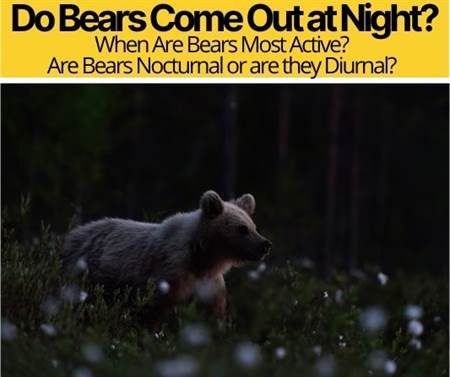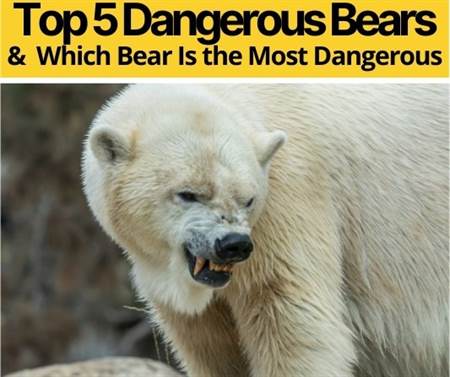 Each year, bears engage in the lengthy and strenuous act of hibernation. Though they are dormant through this task, it is quite involved and extremely vital to the survival of bears.
Each year, bears engage in the lengthy and strenuous act of hibernation. Though they are dormant through this task, it is quite involved and extremely vital to the survival of bears.
Bears all perform hibernation a little differently. In fact, bears do not truly hibernate the way other mammals might do so.
But all bears that do hibernate do so for the same reasons. They undergo the same instincts leading up to hibernation, displaying that it’s a natural process, and bears innately understand this.
Though nature appears effortless, the hibernation process can be quite nuanced.
This article will explain the specifics of hibernation and offer an understanding of the reasons behind bear hibernation practices.
Bear Hibernation Purpose
To humans, the logic seems simple: Hibernation allows bears to escape the cold. However, for bears, it’s much more than that.
Imagine yourself as a massive brown or black bear in a freezing cold climate. The land is frozen with snow, and the wind is biting, but you still need to provide food – a hunt does not seem enticing given the climate.
Bears adapted to this natural predicament in an incredible way.
By intentionally fattening themselves up, they’re able to reach the nearly comatose state of hibernation and sleep out the winter.
Imagine if you didn’t need to provide food for your family for three months – what a relief! Still, there’s a lot of nuance to hibernation in bears, and the state is not always even voluntary.
It serves a purpose to bears by extracting them from the harsh realities of winter.
Just like humans use winter to celebrate in reflection with family, bears also spend quality time with loved ones during hibernation, and it even allows bear mothers a private time to give birth.
Do All Bears Hibernate
Believe it or not, not every bear hibernates or needs to hibernate. For example, a bear that might typically hibernate won’t need to if they’re in captivity, such as a zoo, located in a warmer climate.
While bears in captivity are the exception, there are still bear species that naturally don’t hibernate at all due to warmer habitats that don’t see much food depletion or shortage in cooler seasons.
These species would be Sloth Bears, Giant Pandas, Andean Bears, and Sun Bears.
Some polar bears don’t hibernate at all, with pregnant females being the constant exception.
If a female polar bear is carrying cubs, she will build and use a den amongst the snow until her cubs are born in a few months.
Asiatic black bears only hibernate as a last resort. Some don’t hibernate at all, or some Asiatic black bears migrate south to avoid the necessity.
Other bears, like Brown or American Black bears, are known to hibernate annually.
Related: Do Bears Sleep at Night
When do Bears Hibernate
Bears, like other mammals that hibernate, typically do so in the winter months. Typically, a bear will assume hibernation in October or November, staying put for an average of five months.
Bears sleep all winter because their food supply greatly diminishes as nature’s dwindling months arrive. In the face of cold, bears actually preserve much energy and aggravation by sleeping out the darker months.
The hibernation duration varies greatly between species. Grizzlies may hibernate between five and seven months, re-emerging in days anywhere between March and May.
How Long do Bears Hibernate
Bear hibernation time ranges widely from a few weeks to eight months.
How long bears hibernate is largely dependant on the bear’s natural habitat climate. Bears living in warmer climates do not require a long hibernation; they only need to escape the intensely cold periods.
Mexican Black Bears, who live in warmer climates, may only have a few weeks every year of harsh winter. Therefore, the Mexican Black Bear sometimes only hibernates for less than a month.
Black bears have a typical hibernation period of five months, but they may stay in hibernation for up to seven months in particularly harsh winters.
Some bears hibernate for much longer; the Alaskan Brown Bear endures colder climates than other brown bears, and it’s not uncommon for them to greatly exceed the five-month average by another three months.
That’s eight months of snuggles!
Sometimes, female bears and their cubs will hibernate for a longer duration than grown males.
How do Bears Prepare for Hibernation
In order for hibernation to be successful, bears need to be bulky and high in weight so their bodies can maintain sustenance for an entire still winter.
This means that bears need to make sure they fatten up! Bears can gain up to five hundred pounds leading up to hibernation because they know they will need to keep their bodies warm and alive.
This preparation state is called hyperphagia, and it allows bears to experience rapid weight gain without the dangerous side-effects that humans would succumb to under similar circumstances.
Despite the comatose-like state that bears fall into being largely involuntary, bears still put in many days of hard work preparing for this important event.
They strive to gain enough mass and eat enough food using their innate hunting, fishing, and foraging skills, eating nearly everything in their sight.
Yes, bears actually sit around and eat all day leading up to their hibernation. But it’s a lot of work consuming fifteen to twenty thousand calories a day!
Their work is cut out for them, especially if there’s local competition.
Experienced bears will fight fervently for their right to a seasonal fishing spot since fish are the most sought form of calorie intake for a bear in hyperphagia.
This is because fish offer high nutritional value and yield for the work put in.
Fish brains, eggs, and skin are exactly the type of fatty intake that bears are seeking before hibernation.
Some bears, especially those living inland, don’t see as many highly nutritional fish. However, bears keep fed one way or another, eating hundreds of thousands of berries if they need to fulfill their calorie intake.
It is vital that bears gain mass one way or another if they’re going to hibernate. Hyperphagia is crucial in preparing for hibernation, and bears could not survive hibernation without it.
How do Bears Hibernate & What Happens During Hibernation
Technically, bears do not actually hibernate. Instead, they enter a stage called torpor, which is involuntary, unlike hibernation.
Although bears aren’t eating, urinating, or defecating during hibernation, they also don’t sleep every minute of it. After all, they are living mammals, and it’s a long winter!
However, bears very rarely leave their den during their hibernation period.
Mostly, they will only leave their den if the den itself becomes unusable due to damage, like flooding.
While bears do sometimes have food stored in their den, they mostly avoid eating or drinking throughout hibernation and their body sustains them by lowering its temperature by about 10 degrees and breaking down fat stores.
Amazingly, they lose no strength or muscle from this. Their body hangs on to proteins.
To be expected, a bear in hibernation will get up and pace from time to time, but this is usually for grooming or to switch sleeping positions and avoid getting sore.
Stages of Bear Hibernation
There are five stages to Bear Hibernation.
- Stage 1: Hibernation – During hibernation, a bear is in torpor, sleeping dormant and preserving the needs of its body.
They use up to 4,000 calories a day simply sleeping and nothing else. Blood flow is greatly reduced, as is their oxygen intake, metabolic rate, and heart rate.
- Stage 2: Walking Hibernation – After bears egress and come out of hibernation, they spend about two to three weeks returning to their summer metabolic state.
Their bodily functions are few during this stage.
- Stage 3: Normal Activity – Spring blooms and the bears are back to their usual activity.
Until early autumn, bears are going about their usual business in their lush habitats and eating five to eight thousand calories a day.
- Stage 4: Hyperphagia – Fall returns, and it’s time for hyperphagia to set in the bears again who eat day in and day out in preparation for their long slumber!
In addition to an abundance of food, bears also heavily drink water at this time, and as a consequence, urinate frequently as well.
- Stage 5: Transition – During the days leading up to their return to hibernation, bears cease eating as much, but they continue to keep plenty hydrated.
They sleep almost all day near the water, too, and their heart rate slows considerably.
Where do Bears Hibernate
To provide a safe space for themselves and their loved ones during hibernation bears build dens. Bears typically create a brand new hibernation den each year.
They may start building their den as early as July, but generally, they are doing the bulk of their building dens in September or October, right before hibernation.
Types of dens vary greatly, and bears are skilled at building dens of all sorts.
Some places you may find bear dens are in burrows, hollow trees, brush piles, under the upturned roots of a tree, rock crevices, or caves.
In some climates, snow adds a layer of insulation to the den.
In human-populated habitats, bears have been spotted hibernating in storm sewers, under porches, or road culverts.
When Do Bears Wake Up From Hibernation?
Bears typically begin emerging from their caves and dens right when the snow starts melting, and the greenery comes back to life. This is usually around April.
New mother bears may stay in torpor longer while still tending to their cubs in the dawn of springtime. Eventually, after she regains strength, she will begin teaching her cubs skills like tree climbing.
Bears don’t have the energy to venture too far from their dens for the first few weeks following hibernation. They shed about one-third of their body weight during torpor and need to rejuvenate.
They eat lightly as their metabolism picks up speed again. As the season flourishes and turns to summer, the bears gain their usual strength and energy.
How do Bears Know When to Hibernate
All bears exhibit extremely lethargic behavior in the timeframe leading up to their hibernation. About half of bears begin this sluggishness near the den, and the other half of bears actually begin acting this way quite far from their dens.
Oddly, this doesn’t make it any safer to be nearby them in the wild; brown bear attacks increase the time of the year leading up to hibernation. Just because they are sleepy does not mean they aren’t cranky!
Shorter days and hormonal changes in the bears’ bodies enhance their instinct to hibernate. It’s possible that bears have an ‘internal clock’.
Difference Between Hibernation and Torpor
There are some key points to understanding the differences between torpor and hibernation.
- Hibernation is a voluntary phase. Torpor is not.
- Torpor is a shorter-term comatose-like state that is experienced daily along with the drop in metabolism, temperature, and heart drop to accompany.
- When this state lasts longer than a 24-hour period, it is then considered hibernation.
- Animals that hibernate will emerge every few weeks to indulge bodily needs. Bears do not urinate, defecate nor eat during their “hibernation” of torpor.
- Other animals that experience torpor the same way bears do include skunks and raccoons.
- Animals that truly hibernate include chipmunks, squirrels, bats, and other various animals.
Black Bear Hibernation
Black bears not only hibernate but have adapted to being highly skilled at the process year-round.
As there are specific stages to the process to keep black bears healthy, strong, and thriving in cooler climates, black bears have learned to optimize on their annual torpor.
How Long do They Hibernate?
Black bears hibernate for about six months out of the year. Black bears have been known to begin the hibernation period in early fall, sometime in October or November.
Black bears will reemerge from hibernation in the springtime, when the snow melts, usually around April.
Where do Black Bears Hibernate
Black bears hibernate in dens that they make themselves. Female black bears will begin building their dens around the first weeks of September.
Black bears make their den in whichever area they choose; a hollowed tree, a cave, or under brushes of leaves. She can make her den just about anywhere!
Brown Bear Hibernation
Many brown bears do hibernate, especially if they are in cooler climates or habitats. Alaskan brown bears hibernate for long periods of time, and most northern brown bears hibernate annually.
There are other brown bears that don’t hibernate as long or as frequently, like the Mexican brown bear that only hibernates for a few weeks in some years.
How Long do They Hibernate?
Brown bears have varying lengths of time that they hibernate. Alaskan brown bears, for example, hibernate for a whopping eight months out of the year in some cases.
Other brown bears will only hibernate for about five months on average. This generally begins in the autumn, and they emerge from their dens in the spring.
Where do Brown Bears Hibernate
Brown bears hibernate in self-made dens constructed out of a variety of materials. Like most bears, they are adept at foraging for helpful materials and using their claws, nuzzle and wit to build the perfect den.
Because brown bears are the most widely dispersed species of bear on the planet, the possibilities for where they build their dens are endless!
Grizzly Bear Hibernation
Grizzly bears do hibernate, and they get pretty huge in the weeks leading up to it! Every year, people even gather online to vote for the “fattest bear” before hibernation begins!
Grizzly bears often live in colder climates, but unlike polar bears, they’re not adapted to powering through the snow and brisk, freezing temperatures. Therefore, hibernation is very instinctual for them.
How Long do They Hibernate?
Grizzly bears hibernate for as little as four months up to as much as seven and a half months. They are in hibernation roughly half of their existence! But, they only hibernate for as long as they need to.
Grizzlies know spring is arriving when the snow begins to melt and the nature around them smells fresh. At this time, usually around late March through early May, they’ll emerge from their hibernation den.
Where do Grizzly Bears Hibernate
Grizzly bears can tend to prefer higher mountainous slopes that they can make their den out of. Making their den doesn’t take as long as the rest of their preparation and can take from three to seven days.
Every year, bears make a brand new den for themselves and their cubs to hibernate. Grizzly bears always build their own den autonomously.
Polar Bear Hibernation
Because of the vastly different climate that polar bears live in compared to that of black or brown bears, you may be wondering if all polar bears hibernate.
While not all polar bears hibernate, some polar bears do, but it is considered to be more of an elongated torpor than authentic hibernation. Pregnant mothers make hibernation a priority, as that is their opportunity for a safe and peaceful birth.
Otherwise, many polar bears remain active year-round and do not undergo any form of hibernation.
How Long do They Hibernate?
When polar bears do hibernate, it’s typically for only three to four months, which is much shorter than brown or black bears spend in their cave or den.
Polar bears can hibernate for up to five months if the climate makes it necessary. This is increasingly uncommon as their habitat is warming, and the winters polar bears experience are becoming shorter.
Where do Polar Bears Hibernate?
Female polar bears are known to build dens in snowbanks, using the snow to their advantage as it provides insulation for the hibernation space.
Bear Hibernation Facts
- The larger a mother bear can get herself before hibernation, the bigger her cubs will be born.
- In preparation for the winter, bears eat up to 90 pounds of food a day, sometimes doubling their weight.
- Even bears that become massive before hibernation loses a considerable amount of weight during their long sleep. They often emerge from their dens thin and in need of nutrients.
- Whether or not bears truly “hibernate” is still up for debate, and it can be controversial to scientists. The bottom line is, bears may not hibernate the same way squirrels do, but it’s a form of hibernation still.
- The physical and physiological states that a bear undergoes during hibernation would be fatal to a human.
This is because bears’ bodies don’t give up proteins or muscles as they hibernate. A human attempting the same endeavor would lose considerable muscle strength and bone structure.
- Heart rates in bears in hibernation drop as low as 10 beats per minute!
- Bears very rarely die during hibernation, if ever. If they do, it may be due to flooding or being hunted, but is not usually due to hibernation practices.
- Bears will often awake slightly enough in the den to lick their fur, their paw pads, and other brush around them as general grooming practices. These will all stay in their system until they release excrement in the spring.
- Males emerge from dens first, then females, then their cubs.
Do Bears Go to the Bathroom When They Hibernate
It’s startling, but bears do not urinate during their long hibernation! In the weeks leading up to the great rest, they were working on extracting all waste from their body for undisturbed sleep.
Another fascinating (albeit yucky) fact about a bear’s bathroom habits in the den is the production of a “fecal plug” that prevents the bear from defecating during hibernation.
This is done by intaking plants that the bears knowingly cannot digest.
The indigestible plants purge the digestive system and throughout the months of hibernation, feces, intestinal secretions, plant matter, and even hair (from licking themselves) is gathered in the body’s lower intestines, forming a plug in their bodies.
The more northern the bear, the larger the plug! The plug is dispensed towards the end of the hibernation period, and surprisingly, is not putrid in scent.
Do Bears Give Birth While Hibernating
One of the most incredible occurrences during hibernation is the birth of a bear’s cubs.
In January the cubs are born, and they spend their first few months in hibernation with their mother.
The cubs born the year before will still hibernate with their mother. She’ll have a better chance of birthing more cubs, healthy ones, too, if she bulked up well in the fall.
Yes, the mother is awake during the birth! However, she might fall back into torpor as her young nurse on her.
What Happens if You Wake a Bear From Hibernation?
If you have stumbled upon a bear’s hibernation den and caused them enough alarm to awaken them, it would most definitely set them off, leaving you in a dangerous situation!
If you’re wondering if you can wake up a hibernating bear, it’s safe to say: stay away!
Waking up a hibernating bear is dangerous because bears in hibernation are experiencing intense lethargy and could be aggressive if provoked from that state, especially if their nearby cubs are newly born.
Conclusion
As humans, hibernation may seem like an impossible task, or it might seem useless to us because we enjoy year-round activities. But the process of hibernation is very rewarding for bears, and it fascinates humans because we can learn a lot from bears’ stillness.
Scientists are still discovering facts about hibernation and its purpose. Studying hibernation is even helping them develop insights into improving treatments for diabetes and metabolic ailments in the near future.






